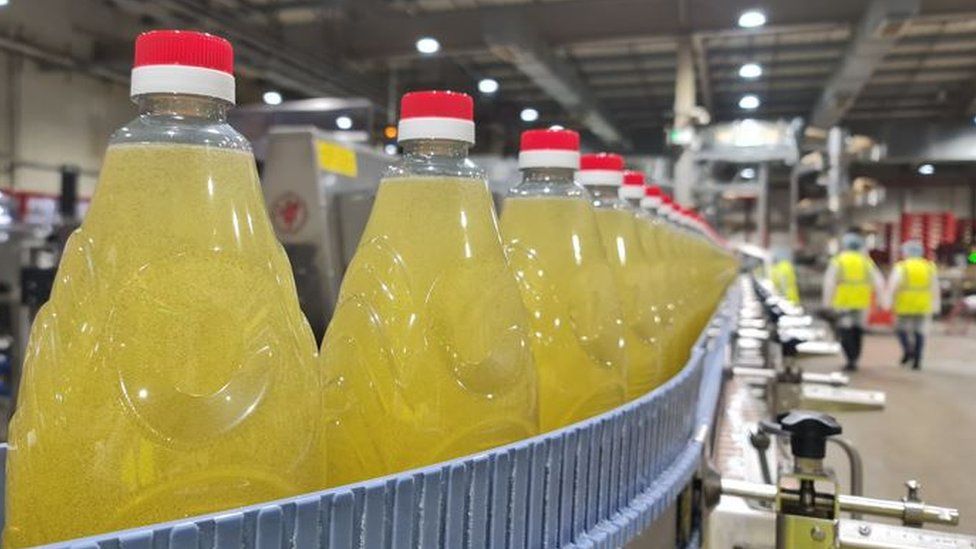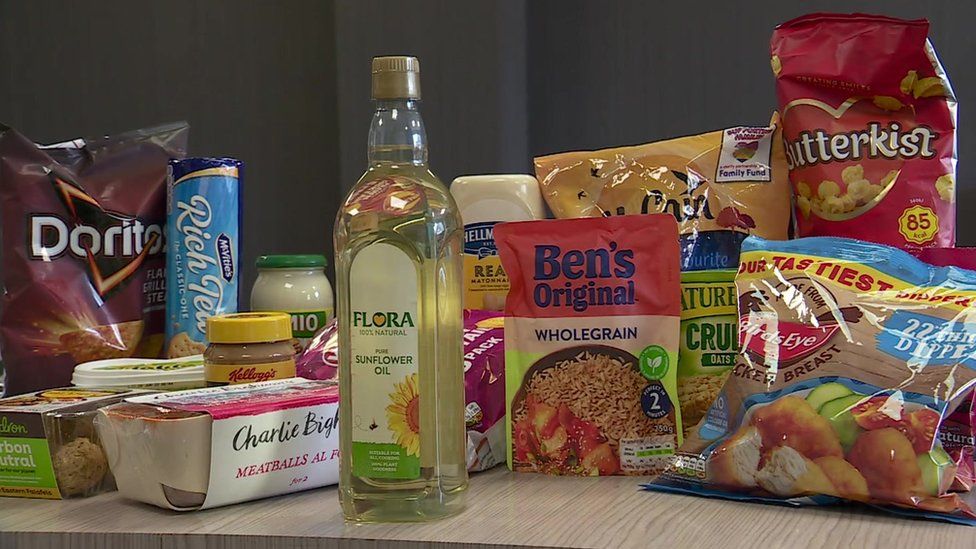Makers of oven chips, crisps, ready meals and cereal bars are racing to find alternatives.

Image source, Edible Oils
The biggest cooking oil bottler for UK shops has said it only has a few weeks’ supply of sunflower oil left.
Ukraine and Russia produce most of the world’s sunflower oil and the war is disrupting exports, said Edible Oils.
The company, which packages oil for 75% of the UK retail market, is ramping up supplies of other oils for shoppers.
Meanwhile, manufacturers of foods that contain sunflower oil, like crisps, oven chips and cereal bars, are reworking their recipes.
The Food Standards Agency has advised people with allergies to look out for extra information from shops and food makers.
Kim Matthews, commercial director at Edible Oils said 80% of the global supply of sunflower oil comes out of Russia and Ukraine.
“So obviously, with everything going on out there, we physically can’t get sunflower to be coming out of the country,” he said.

If you buy any cooking oil on the supermarket shelves, chances are it has come from the Edible Oils plant in Erith, on the outskirts of south-east London. It bottles oil for brands and retailers own label products.
“From a UK consumer perspective, sunflower oil is the biggest oil. It’s used more than anything else,” said Mr Matthews.
“It’s a fast moving situation. We’re still trying to see if we can get some more but it’s looking very tight.”
Edible Oils Ltd has upped production to 24/7 to try to make sure it has plenty of rapeseed and other oils to put on the shelves when the sunflower oil goes.
“Sunflower is great because you can cook at high temperatures. Rapeseed is very similar. You can do exactly the same with it,” he said.
But it was far from clear when sunflower oil supplies will be back to normal, he said.
“At the moment, Ukrainian farmers should be sowing the seeds now for the harvest in October and November.
“Clearly that’s not going to happen… we’re probably going to miss the season so we could be impacted for 12-18 months.”

Sunflower oil can also be found in many hundreds of products, like ready meals, biscuits and mayonnaise.
Food manufacturers are now racing to find alternative ingredients.
The British Snack Company makes a small but popular range of hand cooked crisps for sale in pubs. After potatoes, its other key ingredient is sunflower oil.
“The supply of sunflower oil is something that we’ve always taken for granted,” said founder Tom Locke.
Shortly after the invasion, he had to quickly come up with a plan B and has already switched to rapeseed oil, which is very similar.
“There’s an incredible scramble. Everyone’s doing the same thing. So while sunflower oil is impossible to get at the moment, rapeseed oil is possible but difficult to get as well obviously because everyone’s having the same idea, as prices are skyrocketing at the moment.”

Rapeseed is used far more in the food supply chain, according to the National Edible Oil Distributors’ Association.
British farmers grow rapeseed but there won’t be enough to go round.
“Prices for rapeseed oil have risen 50-70% since the attack,” said NEODA’s President Gary Lewis. “But there’s a limited supply to cover all this demand so some shortfall will be expected.”
Mr Locke’s crisp business had to pay through the nose because otherwise he would have run out of crisps, which makes up more than two-thirds of his sales.
He says he’ll absorb the costs as much as he can, but if the situation carries on he’ll have to increase prices.
One immediate headache he and other food manufacturers don’t have to worry about is labelling. They’re being allowed to switch ingredients without having to print new packaging, which can take up to 12 weeks.
The Food Standards Agency said allergic reactions to rapeseed oil were “very rare and if they do occur are mild”, and advised anyone with allergies to look out for extra information.

For grocery expert, Ged Futter, the food industry is now grappling with supply issues not experienced since the end of World War Two.
“Retailers and suppliers have to work much more closely than they ever have before and to be much more flexible in their approach to make sure the products are on the shelf,” he said.
“The immediate focus is sunflower oil and rapeseed oil, but there will be many more products which will be affected over the coming months. It’s some of the ingredients you don’t even think about, like starch, which comes from wheat.”
He believes thousands of products will have to be reformulated.
Mr Futter runs a business advising suppliers on how to deal with retailers. He says the ripple effects from the war are creating “scarily high” price rises, adding to already rising prices on the supermarket shelves.
“I think the level of food inflation we are now going to be seeing will be in excess of 15%.”
